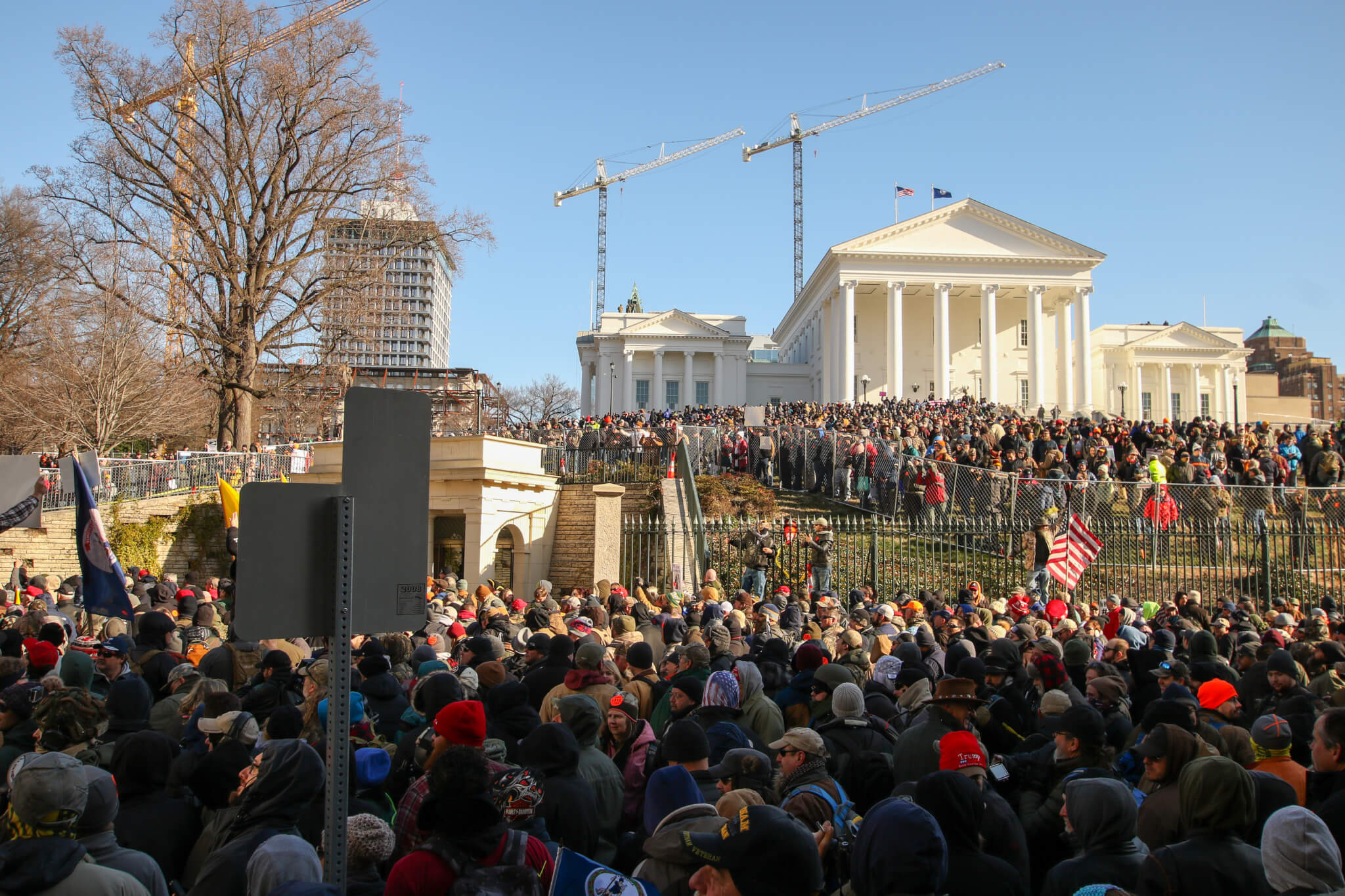
January 20, 2020 : Pro Second Amendment Gun Rights Rally on the grounds of the Virginia State Capitol with crowds of people protesting the new gun laws. ButtermilkgirlVirginia on Shutterstock
by Graham Moomaw, Virginia Mercury
Gov. Glenn Youngkin’s administration last fall applied for federal funding meant to help Virginia continue to implement its red flag law, a gun control measure strongly opposed by many Republican lawmakers and gun rights activists. State officials say the roughly $5 million hasn’t been formally accepted and no decisions have been made about how it might be used.
Virginia’s system of substantial risk orders (SROs), created by legislation Democrats passed in 2020 and colloquially known as the red flag law, remains a controversial subject for conservatives, who have called for its repeal but currently lack the legislative majorities needed to scrap it.
Youngkin has billed himself as a gun rights supporter, but his position on red flag laws is unclear. The governor’s office did not provide an answer when asked where he stands on the issue. Youngkin, who is widely thought to be considering a run for president, has seemed less eager to lean in on guns than he has been on other hot-button cultural topics like abortion and how to handle race and gender issues in public education.
It’s also unclear how a Republican governor appearing to lend tacit support to a red flag law he didn’t sign might play in a GOP presidential primary, but some gun rights proponents in Virginia are calling for Youngkin to reject the federal funding altogether.
“I expected better from Governor Youngkin on that,” said Philip Van Cleave, president of the pro-gun Virginia Citizens Defense League. “This needs to be repealed, not expanded.”
Red flag laws have been pitched around the country as a way to prevent mass shootings, suicides and other violence carried out by people with a demonstrated history of threatening or erratic behavior. Under Virginia’s law, judges and magistrates can order guns to be seized from people deemed a danger to themselves or others for up to 14 days before a court hearing is held to give the affected person a chance to argue their firearms should be returned.
Proponents of red flag laws see them as a reasonable precaution to try to prevent some troubled people from lashing out violently, given the repeated examples of mass shootings carried out by people who had shown clear warning signs but were still able to purchase and possess firearms.
Criticism of the laws is largely based on due process concerns and opposition to the idea of letting police seize firearms from people who may never be charged with a crime.
In mid-February, President Joe Biden’s Department of Justice announced it had awarded roughly $231 million in crisis intervention grants to states, the District of Columbia and U.S. territories. That funding, part of the Byrne State Crisis Intervention Program, was included in a bipartisan anti-gun violence bill Congress passed in 2022 after mass shootings at a Buffalo, New York supermarket and an elementary school in Uvalde, Texas.
Though the funding can be used for a variety of anti-violence initiatives, the Department of Justice’s description of the program and Virginia’s application for the money put a clear emphasis on promoting the use of red flag laws. Lori Haas, a Virginia gun violence prevention activist, said the state should follow through with using the money for its intended purpose.
“Law enforcement agencies across the commonwealth need staff and training to robustly implement risk orders in the commonwealth,” said Haas, advocacy manager for the Center for Gun Violence Solutions at the Johns Hopkins School of Public Health. “Some jurisdictions have embraced using this tool to prevent gun violence, but far too many have not.”
The red flag angle was spelled out clearly in a funding application submitted by the Virginia Department of Criminal Justice Services.
In its application, the agency said it expected to use the funding on training to help law enforcement, courts, prosecutors and public health officials on crisis intervention and tools available to reduce gun violence.
“DCJS will also fund grant applications that seek to increase law enforcement agencies’ understanding of Virginia’s substantial risk order laws, including when they are applicable and how to initiate and carry out the SRO petition process,” said the application, which the Virginia Mercury obtained through a Freedom of Information Act request. “This funding will help expand the reach of DCJS’ current training efforts related to SRO implementation and awareness in Virginia.”
In addition, the application said Virginia expects to use the funding to help law enforcement and local government agencies “more safely and efficiently store, track and return firearms relinquished” under the red flag law.
The document also says funding could be used on broader behavioral health initiatives meant to help people in crisis and improve training for public officials on how to respond effectively.
In an email, DCJS Director Jackson Miller indicated plans for the funding are less clear than the application suggests.
“No decisions have been made on how Virginia will use the funds if/when the funds are accepted,” Miller said.
The federal grant money comes with a “pass-through” rule requiring 40% to be allocated to local government officials for locally designed programs. It’s unclear how much discretion the state would have to dictate how localities can or can’t use the money. The federal program’s guidelines call for the creation of state-level Crisis Intervention Advisory Boards that would approve plans for how the money should be spent.
Miller said there’s no deadline for Virginia to accept or reject the funding. A spokesman for the DOJ’s Bureau of Justice Assistance, which is overseeing the grant funding, said Virginia must accept the money by Sept. 30, 2026, when the grant period ends.
Politics

VIDEO: Domestic abuse victims speak out against the gun law bills Gov. Glenn Youngkin vetoed
Senate Bill 47 and House Bill 46 aim to close the loophole that allows offenders to transfer their firearms to someone else instead of relinquishing...

Virginia Beach nurse: Rep. Kiggans should stand with patients, protect the ACA
With almost 350,000 Virginians relying on the Affordable Care Act for their health insurance, it is critical that Virginians know their members of...
Local News

Virginia verses: Celebrating 5 poetic icons for National Poetry Month
There’s no shortage of great writers when it comes to our commonwealth. From the haunting verses of Edgar Allan Poe, who found solace in Richmond's...

Join the fun: Recapping Family Literacy Night’s storybook adventures
When’s the last time you read a book aloud with a loved one? If it’s difficult to answer that question, then maybe it’s time to dust off that TBR...





